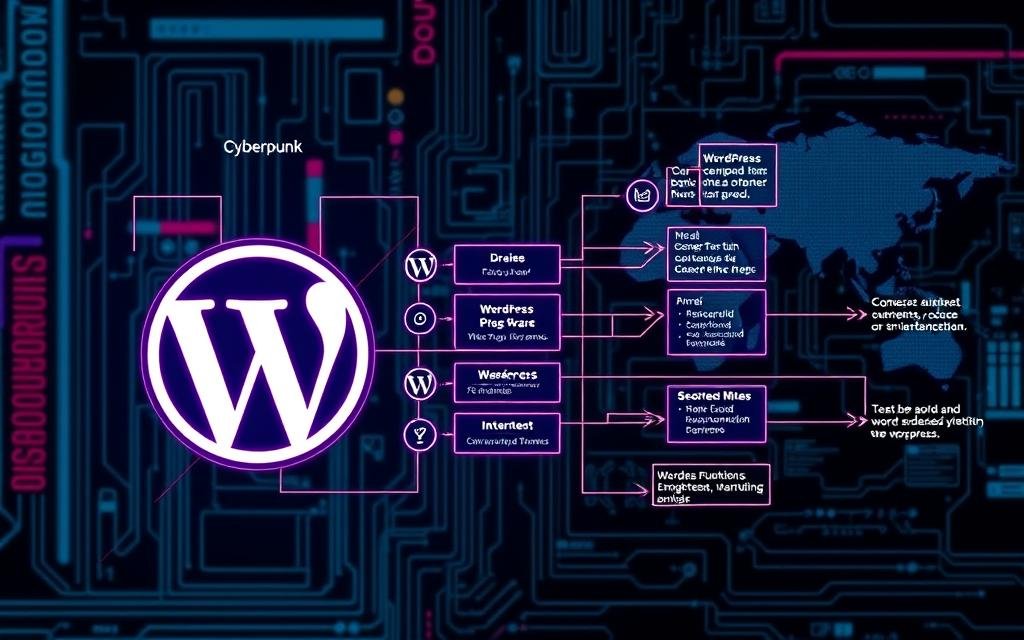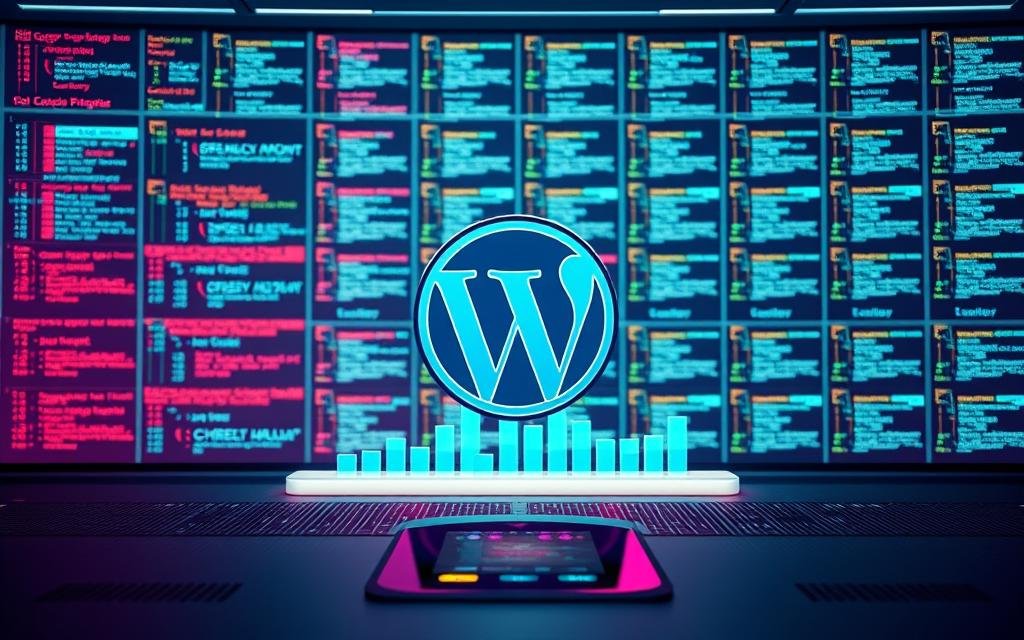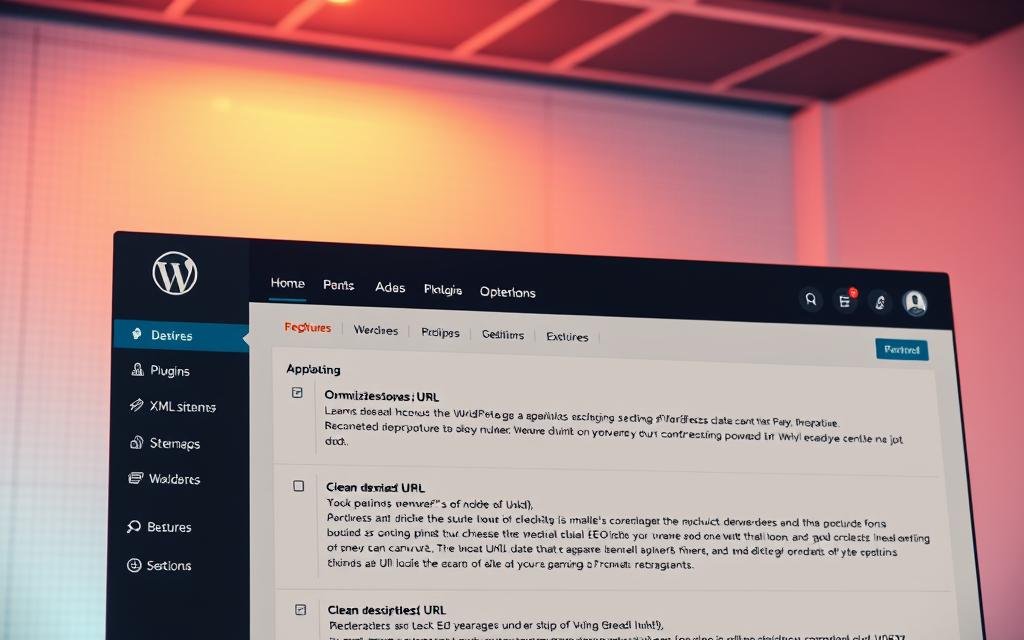Creating a website that looks good and is easy for search engines to find is key. With wordpress development, you can make your site both attractive and search engine friendly. WordPress.com websites come with default SEO features to help you start strong.
WordPress.com sites are already set up for search engines, giving you a good base. But, there’s more you can do to get more people to find your site. Good website building can boost your site’s SEO, bringing in more visitors and making you more visible online.
Key Takeaways
- WordPress.com websites are optimized for search engines by default.
- Additional steps can be taken to improve a site’s SEO.
- Effective website building strategies can enhance SEO.
- A well-optimized website can drive more traffic and increase online visibility.
- WordPress development can help create a visually appealing and search engine friendly website.
Understanding the Connection Between WordPress Development and SEO
Effective WordPress development is key to a strong SEO strategy. A well-made website boosts user experience and search rankings.
The Technical Foundation of SEO-Friendly WordPress Sites
WordPress development’s technical side is vital for SEO. It includes site speed, mobile responsiveness, and clean code. A fast, mobile-friendly site is crucial for a good user experience, which helps SEO.
- Optimized images and minified CSS files speed up page loads.
- Mobile responsiveness makes the site work on all devices.
- Clean code helps search engines crawl and index the site.
Key SEO Benefits of Professional WordPress Development
Professional WordPress development brings many SEO benefits, including:
- Improved site structure: A clear site structure helps search engines understand content.
- Customizable meta tags: Easy customization of meta tags, titles, and descriptions is possible.
- Enhanced security: A secure site (HTTPS) is a ranking factor, and professional development ensures it.
How WordPress Architecture Supports Search Engine Rankings
WordPress architecture is crucial for search engine rankings. A good design makes the site crawlable, indexable, and accessible to search engines. It uses custom post types, taxonomies, and permalinks for a logical content structure.

Understanding the link between WordPress development and SEO is essential. It helps create a strong online presence. This involves using technical development, custom themes, and best practices to boost search rankings.
The Impact of Clean Code on Search Engine Rankings
Clean code is key for any WordPress project. It makes websites look good and work well. By focusing on plugin development and WordPress design, developers can make sites load faster and improve SEO.
Clean code helps with SEO in many ways. It makes websites easier for search engines to crawl and index. This can lead to better visibility in search results. Also, clean code reduces errors that can slow down search engines.
“Clean code is simple and direct. Clean code reads like well-written prose.” – Grady Booch
Also, clean code makes websites easier to maintain. When code is organized, developers can update it without problems. This is important for keeping a site optimized for search engines.
| Characteristics | Clean Code | Poorly Structured Code |
|---|---|---|
| Loading Speed | Faster | Slower |
| Crawlability | Easier for search engines to crawl | More difficult for search engines to crawl |
| Maintainability | Easier to update and maintain | More challenging to update and maintain |
The table shows clean code’s benefits over messy code. It’s better for loading speed, crawlability, and maintenance.
In summary, clean code is vital for WordPress development and SEO. By focusing on clean code, developers can make websites that look great and work well for search engines.
Essential WordPress Development Practices for Better SEO
WordPress development is key to SEO success. There are several practices to focus on. By optimizing your WordPress site, you can boost its visibility and ranking on search engines.

Optimizing WordPress Core Files
Optimizing WordPress core files is vital for better SEO. It means keeping core files clean, updated, and free from extra code. Clean code helps search engines crawl and index your site better, leading to higher rankings.
To optimize core files, developers should avoid making too many changes. Instead, use hooks and plugins to add functionality without altering core code.
Database Organization Techniques
A well-organized database is crucial for site performance. Database optimization includes cleaning up unnecessary data, optimizing tables, and indexing the database properly.
- Regularly clean up data like post revisions and spam comments.
- Use plugins like WP-Optimize to make database optimization easier.
- Make sure database tables are indexed for better query performance.
Theme Development Best Practices
Theme development is vital for SEO. A good theme should be responsive, adapting to different screen sizes and devices. It should also be optimized for SEO with proper heading structures, clean code, and fast loading times.
When developing a theme, keep these best practices in mind:
- Use a mobile-first approach for responsiveness.
- Optimize images and minify CSS and JavaScript for faster loading.
- Make sure the theme works with the latest WordPress and SEO plugins.
By following these essential WordPress development practices, you can greatly improve your site’s SEO. Focus on optimizing core files, organizing your database, and creating SEO-friendly themes. This will help boost your site’s search engine rankings and overall performance.
Custom Theme Development vs. Pre-built Themes: SEO Perspective
Choosing between custom theme development and pre-built themes is key in website building. This choice can greatly affect your site’s search engine ranking and performance.
Custom theme development has many SEO benefits. It lets you tailor your site’s structure and design for search engines. This means you can make your site easier for search engines to crawl and index.
Pre-built themes, on the other hand, are quick and easy to use. They let you start your site fast. But, they might have extra code and features that slow your site down. Pre-built themes can be a good starting point, but they often need a lot of customization for SEO.

Here are some key things to think about when choosing between custom theme development and pre-built themes for SEO:
- Code Quality: Custom themes usually have cleaner code, which can make your site faster and easier for search engines to crawl.
- Customization: With a custom theme, you can make SEO-specific changes easily. You’re not limited by the theme’s design or functionality.
- Performance: Pre-built themes might have extra features that slow your site down. Custom themes can be optimized for better performance.
- SEO Features: Custom themes can be made with SEO in mind from the start. They can include things like schema markup and optimized meta tags.
The choice between custom theme development and pre-built themes depends on your needs and resources. If you have the budget and know-how, a custom theme can give you big SEO benefits. But, a well-optimized pre-built theme can also work well with the right customization and SEO efforts.
Plugin Integration Strategies for Enhanced SEO Performance
Plugin integration is key to making WordPress sites better for search engines. By picking and setting up plugins wisely, developers can boost a site’s SEO. It’s about knowing how plugins affect search rankings.

Getting plugins to work well together is crucial. It’s not just about installing them. It’s about making sure they fit with the site’s design and content. This means choosing plugins that match the site’s theme and other plugins, and setting them up for SEO goals.
Essential SEO Plugins for WordPress
WordPress has many SEO plugins, each with its own benefits. Some top ones are:
- Yoast SEO: Great for optimizing content, meta tags, and links.
- All in One SEO Pack: Offers lots of SEO features, like XML sitemap support.
- SEOPress: Easy to use, with advanced SEO tools like content analysis.
These plugins make SEO easier, from keywords to technical audits. They help improve a site’s search engine ranking.
Custom Plugin Development for Unique SEO Needs
Some sites need special SEO solutions that standard plugins can’t provide. Custom plugin development offers tailored solutions. It’s about creating plugins for specific needs, like advanced content checks or custom meta tags.
Creating custom plugins needs deep knowledge of search engine algorithms and WordPress. They help solve unique SEO problems and boost site performance.
Plugin Conflict Management
Managing plugin conflicts is a big challenge. When many plugins are used, they can clash or cause errors. To avoid this, it’s important to:
- Test plugins well before using them live.
- Watch site performance and error logs for conflicts.
- Keep plugins updated for the latest WordPress and plugin compatibility.
By planning plugin use and management, developers can improve SEO while avoiding problems. It’s about choosing the right plugins, setting them up right, and making sure they work well together.
Mobile-First WordPress Development Approaches
The move to mobile browsing has made mobile-first WordPress development key for better user experience and SEO. Most users now access websites on mobiles. A mobile-first approach makes your site better for smaller screens, improving usability and engagement.
Plugin development is a big part of mobile-first development. Choosing and making plugins for mobile can boost your site’s functionality without slowing it down. It’s important to pick lightweight plugins and make sure they work well on different mobile devices and screen sizes.

WordPress design is also crucial in mobile-first development. A responsive design that changes well with different screen sizes is vital for a good user experience. Using flexible grids, images, and media queries helps your site look and work great on both desktop and mobile.
Going mobile-first can also make your site load faster. Faster sites are better for users and SEO. They lead to more engagement, less bouncing off, and better search rankings.
In short, mobile-first WordPress development is essential today. By focusing on plugin development and WordPress design, you can make a site that looks good and works well. It will also be friendly to search engines.
Speed Optimization Through Advanced WordPress Development
In today’s digital world, a fast WordPress site is essential for SEO success. Advanced WordPress development is key to achieving this speed. It boosts user experience and search engine rankings.
Speed optimization involves server-side, client-side, and caching techniques. These methods ensure your WordPress site stays competitive in the fast digital world.

Server-Side Optimization Techniques
Server-side optimization is vital for your WordPress site’s performance. Techniques like optimizing server response times, using HTTP/2, and a content delivery network (CDN) reduce latency. They improve site speed overall.
- Enable GZIP compression to reduce file sizes.
- Optimize database queries to minimize server load.
- Utilize a fast and reliable web server software.
Client-Side Performance Enhancements
Client-side optimizations focus on browser performance. This includes minifying CSS and JavaScript files, optimizing images, and using browser caching. These steps significantly cut down page load times.
“Optimizing images can reduce page load times by up to 50%.”
Caching Implementation Strategies
Caching is a powerful way to speed up WordPress sites. It stores often-used resources in cache, reducing server requests. This leads to faster load times. Effective strategies include page caching, object caching, and using a cache plugin suited to your site.
| Caching Method | Description | Benefit |
|---|---|---|
| Page Caching | Stores entire HTML pages for quick retrieval. | Reduces server load and improves page load times. |
| Object Caching | Caches database queries and objects. | Enhances performance by reducing database load. |
By using these advanced WordPress development techniques, you can make your site faster and more responsive. This not only enhances user experience but also supports your SEO efforts.
Content Structure and URL Architecture in WordPress
The way your WordPress site’s content and URLs are set up greatly affects its SEO. A good content structure and URL design are key to making your site more visible on search engines. By using wordpress customization and website building wisely, you can make your site easy to use and search engine friendly.
A well-organized content structure helps search engines understand your site’s layout and what it’s about. This can be done by grouping content into clear sections and using descriptive headings. Effective categorization makes it easier for both users and search engines to find what they need.
URL architecture is about how your website’s URLs are set up. A clean, descriptive URL structure boosts both user experience and SEO. URLs should be short, include important keywords, and show the content’s hierarchy. For example, “example.com/seo-tips/wordpress-optimization” is better than “example.com/?p=123” for SEO.

To build a well-organized website, start by planning your content’s hierarchy. Use categories and subcategories to organize your content in a logical way. Make sure your URLs are clear and follow a consistent pattern. Use WordPress features like permalinks to customize your URL structure.
In summary, a well-structured content framework and clear URL architecture are crucial for SEO success in WordPress. By applying effective wordpress customization and website building strategies, you can boost your site’s visibility, user experience, and search engine rankings.
Implementing Schema Markup Through WordPress Development
Schema markup is now key in WordPress development. It helps your site show up better in search results. This is because search engines are getting smarter at understanding web content.

Schema markup gives search engines more info about your site’s content. It helps them see how different parts of your page relate to each other. This can make your site stand out in search results, with features like rich snippets that boost clicks.
Custom Post Types and Schema Integration
WordPress lets you create special types of posts. This is great for complex content. Adding schema markup to these custom post types gives search engines more details about your content.
For example, with a custom post type for events, you can add schema markup. This includes event dates, locations, and ticket info. It makes your site more discoverable and can get you featured in more searches.
“Schema markup is a powerful tool that can significantly enhance your website’s SEO performance by providing search engines with a clearer understanding of your content.”
Automated Schema Implementation
While you can do schema markup manually, using plugins can make it easier. These plugins automate the process and keep your schema markup up to date.
When picking a plugin, look for one that’s well-reviewed, updated regularly, and works with your WordPress version. Also, see if the plugin lets you customize your schema markup. This can affect how well it works for your site.
Using WordPress to implement schema markup can boost your site’s SEO. As search engines keep getting better, using schema markup can give you an edge over competitors.
Security Measures in WordPress Development for SEO
A secure WordPress site protects user data and boosts search engine rankings. Search engines like Google favor secure sites. This makes security key for SEO.
Implementing Security Measures through effective WordPress development is crucial. Use secure protocols like HTTPS for data transmission. Also, keep all plugins and themes updated from trusted sources.

Plugin development is vital for WordPress security. Developers must follow secure coding practices. This includes validating user input and using nonces to stop CSRF attacks. Keeping plugins and themes updated helps fix security holes.
WordPress design affects security too. A well-designed site with strong security can block attacks like SQL injection and XSS. This protects user data and keeps the site visible to search engines.
- Use secure protocols like HTTPS to encrypt data transmitted between your site and its users.
- Regularly update plugins and themes to patch security vulnerabilities.
- Implement secure coding practices in plugin development to prevent common web attacks.
- Design your WordPress site with security in mind to protect against SQL injection and XSS attacks.
By adding these security steps to your WordPress development, you can boost your site’s SEO. Secure sites get better rankings, making your site more visible and trusted.
International SEO Considerations in WordPress Development
As businesses grow globally, knowing about international SEO in WordPress is key. Your website must reach and be seen by people in many places and languages.
Creating a strong international SEO plan for WordPress needs careful thought. Search engines like Google look at many things to see if your site is right for users in different places.
Multilingual Support Implementation
Offering support in many languages is a big part of international SEO. This means translating your site’s content into various languages. WordPress has plugins and methods to help, like WPML or separate sites for each language.
A good multilingual plan makes your site better for users and helps it show up in search results for different languages. It’s also important to make sure search engines can find your multilingual content.
| Multilingual Support Method | Pros | Cons |
|---|---|---|
| WPML Plugin | Easy to manage translations, supports many languages | Can be costly, requires additional configuration |
| Separate WordPress Installations | Full control over each language version, easier to manage complex sites | More resource-intensive, requires duplicated effort for updates |
| Automated Translation Services | Quick and cost-effective | May lack accuracy, not suitable for all content types |
Geographic Targeting Strategies
Geographic targeting is also key in international SEO. It means making your site rank well in certain countries or areas. WordPress developers use many ways to do this, like country-specific domains, subdomains, or subdirectories.
Country-specific top-level domains (ccTLDs) are the best way to target areas. For example, a .ca domain for Canada or .de for Germany can help your site show up more in those places.
You can also use subdomains or subdirectories with a generic domain like .com. For example, en-au.example.com for Australia or example.com/fr-ca for French-speaking Canada. These methods work well but might need extra setup in WordPress and SEO tools.
By using these international SEO tips in WordPress, you can make your site more visible worldwide. This brings more targeted visitors to your site.
Analytics Integration Through Custom Development
Custom WordPress development lets you add advanced analytics tools. This gives you deeper insights into your site’s traffic and user behavior. It’s key to see how visitors use your site, find areas to improve, and make smart decisions to boost your site’s performance.
Custom analytics integration offers the chance to set up detailed tracking. You can use Google Analytics or other tools to watch specific metrics that matter to your business. This way, you understand your audience better and what they like.
Setting Up Advanced Tracking
To track advanced metrics, you need to set up your analytics tool. This means tracking important KPIs like page views, bounce rates, and conversion rates. You can do this with custom event tracking and goal setting in Google Analytics.
| Tracking Method | Description | Benefits |
|---|---|---|
| Event Tracking | Tracks specific user interactions like button clicks or form submissions. | Provides insights into user engagement and behavior. |
| Goal Setting | Allows you to define and track specific conversion goals. | Helps measure the effectiveness of your website in achieving business objectives. |
Custom Dashboard Development
Custom dashboard development means creating a special analytics dashboard. It shows the most important data for your business. This is done through WordPress customization with plugins like WP Dashboard Notes or a custom solution.
By adding custom analytics solutions through WordPress, you can improve your site’s performance. Making data-driven decisions helps grow your business. Good website building and advanced analytics can greatly enhance your online presence.
WordPress Development for E-commerce SEO
WordPress is key for making e-commerce sites that are easy to use and rank well in search engines. With so many online stores out there, it’s important to stand out. Good WordPress development uses SEO-friendly practices and custom themes made for e-commerce.
Choosing and customizing themes is a big part of WordPress for e-commerce SEO. A good theme makes the site look great and helps it rank better in search engines. Custom themes let businesses show off their products in the best way. They can also be made to work well with different search engines, making the site more visible.
For e-commerce SEO, there are many important things to think about. Here are some key ones:
- Product page optimization
- Category page structuring
- Image optimization
- Mobile responsiveness
- Page loading speed
WordPress lets you add plugins and tools to improve these areas. For example, plugins can make product pages better, speed up image loading, and make sure the site works on mobile. Also, custom development can make category pages unique and SEO-optimized, helping the site rank higher.
To get the most SEO benefits, e-commerce sites should also:
- Make high-quality, keyword-rich content
- Use schema markup for products
- Keep product listings and descriptions up to date
By using WordPress well and following these SEO tips, e-commerce sites can get more online visibility. This can help attract more customers.
Future-Proofing Your WordPress SEO Through Development
Your site’s SEO future is tied to using the latest WordPress development methods. As tech improves and search engines get smarter, keeping up is key to staying visible. Good WordPress development means more than just looks; it’s about search engine optimization too.
Staying ahead in WordPress SEO means using new tech. This means keeping up with the latest in WordPress and adding it to your site. For example, new plugin development has brought advanced SEO tools that boost your site’s performance.
Emerging Technologies Integration
New tech like AI, machine learning, and voice search is changing SEO. Adding these to your WordPress site through WordPress design and development can give you an edge. For instance, voice search optimization can make your site more user-friendly and visible in search results.
The table below shows how new tech can impact WordPress SEO:
| Technology | Impact on SEO | WordPress Integration |
|---|---|---|
| AI and Machine Learning | Improved content analysis and personalization | Plugins like Yoast SEO Premium offer AI-powered content analysis |
| Voice Search Optimization | Increased visibility in voice search results | Plugins like WP Rocket can optimize site speed, a factor in voice search ranking |
| AMP (Accelerated Mobile Pages) | Improved mobile user experience and search rankings | AMP plugins for WordPress simplify the implementation process |
Scalability Planning
Scalability is key for your WordPress SEO future. As your site grows, it needs to handle more traffic and content without slowing down. This means planning for growth from the start, including choosing scalable hosting and optimizing your database.
To scale your site, consider these strategies:
- Choose a scalable hosting solution that can grow with your site
- Optimize your database regularly to maintain performance
- Use a modular WordPress design that allows for easy updates and expansions
- Invest in plugin development that is tailored to your site’s specific needs
By using new tech and planning for growth, your WordPress site will stay competitive and SEO-friendly. This forward-thinking approach boosts your site’s performance now and prepares it for the future.
Conclusion: Maximizing SEO Success Through Professional WordPress Development
Professional WordPress development is key for SEO success. It helps create a website that works well on all devices. This makes the site easy to use and boosts its ranking on search engines.
Good SEO through WordPress means having a solid technical base. It also means clean code and smart plugin use. This makes the site friendly to search engines and ready to grow.
Customizing WordPress is important to stand out. It lets businesses make their site fit their needs. This can improve their online image and attract more visitors.
By using responsive design, SEO optimization, and WordPress customization, businesses can build a strong online presence. This supports their SEO goals and helps them succeed in the long run.
FAQ
How does WordPress development impact SEO?
WordPress development is key for better SEO. It makes your site look good and rank well in search engines. A well-made site loads fast, is easy to use, and ranks higher.
What is the importance of clean code in WordPress development for SEO?
Clean code is vital for SEO. It makes your site fast, easy to use, and ranks better. With good design and plugins, your site will be both pretty and search engine friendly.
How does custom theme development compare to pre-built themes from an SEO perspective?
Custom themes give you more control and flexibility. They can lead to better SEO. Pre-built themes might slow your site with extra code. Custom themes make your site unique and SEO-friendly.
What are the best practices for plugin integration in WordPress for SEO?
Using plugins wisely is key for SEO. Choose the right plugins and manage conflicts. Good web development and themes make your site functional and SEO-friendly.
How does mobile-first WordPress development impact SEO?
Mobile-first design improves user experience and SEO. It makes your site fast and friendly for mobile users. A mobile-friendly site is a must for good rankings.
What are the benefits of speed optimization through advanced WordPress development?
Speed is crucial for SEO. It makes your site fast and user-friendly. Use server-side and client-side optimizations, and caching to boost your site’s speed.
How does schema markup impact SEO in WordPress?
Schema markup adds context to your site’s content. It helps your site show up better in search results. Good web development and themes make your site SEO-friendly.
What are the international SEO considerations in WordPress development?
International SEO is important for sites targeting different languages and regions. Support multiple languages and target specific regions for better visibility. Responsive design and SEO make your site friendly for all users.
How does analytics integration impact SEO in WordPress?
Analytics help you understand your site’s performance. They guide your decisions with data. Custom dashboards and tracking give you insights for improvement. Good design and building make your site unique and SEO-friendly.
What is the importance of security measures in WordPress development for SEO?
Security protects your site from threats. A secure site ranks better and is more trustworthy. Good design and plugins keep your site safe and SEO-friendly.

Excellent insights. WordPress development plays a crucial role in enhancing SEO by offering clean code, mobile responsiveness, and seamless plugin integration. A well-optimized WordPress site not only improves search rankings but also delivers a better user experience. Thanks for shedding light on this important connection.
O desenvolvimento no WordPress é essencial para quem busca melhorar o SEO e atrair mais visitantes. Além de ser uma plataforma amigável para mecanismos de busca, ele oferece recursos que potencializam a visibilidade online. Criar um site bem estruturado e otimizado garante uma experiência melhor para o usuário. Esse artigo destacou pontos importantes para quem quer começar forte no digital. A integração entre design e SEO realmente faz toda a diferença!